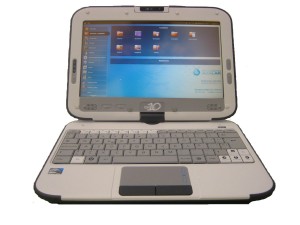The Intel Classmate PC is a netbook created by Intel that falls into the category of low-cost personal computers, whose target are the children in the developing world.
We have some of those laptops at Igalia, concretely 4th generation ones, due to the collaboration we have with the Xunta de Galicia’s Abalar Project. Historically, the hardware devices of this netbook were fully supported by the linux kernel (through the ACPI_CMPC configuration option), but playing a bit with the 4th generation devices, we realized that both the accelerometer and the extra keys were not working properly.
Well, I’m a member of the Igalia kernel team, so I put my hands into the problem 🙂
Digging a bit I found that the accelerometer was not working because the model had changed from the previous generation. This new hardware was reported with a different ACPI identifier (ACCE0001 instead ACCE0000), and also had some differences with the previous one (that I discovered searching here and there and doing some experimentation, as I wasn’t able to find the specifications)
- The accelerometer had a new parameter besides the sensibility, the dynamic range, that had to be set to +/-1.5g or +/-6g
- The value reported by for the axis was in the range (-255, 255), instead of (0, 255) of the previous model
- It was necessary to set both the sensitivity and the dynamic range every time before starting the operation of the accelerometer, or it wouldn’t work
So I created a patch to handle this new device and sent it to the platform drivers mailing list, and it was accepted 🙂
While talking in the mailing list with the maintainer of the CMPC driver, I also found the reason why the extra keys were not working. The driver for the keys was expecting to handle a device with identifier FnBT0000, but at some point the ACPI support in the kernel changed to report always uppercase identifiers, so the device was reporting FNBT0000. Of course, the comparation is case sensitive, so the driver was not matching the device.
Fixing this was quite easy, so I sent this second patch for it, and it was also integrated.
Both changes were released in the official 3.6 version of the Linux Kernel. Enjoy!! 🙂

Amazing work !. I’m curious about the use of these laptops in the Xunta managed schools. Do you have any links for more info ? l’d like to know which software they use and the academic plan that support the project.
Juanjo, there is a moodle with some open courses about the Abalar program here:
http://www.edu.xunta.es/centros/abalar/aulavirtual/
hope they’re useful to you! 🙂